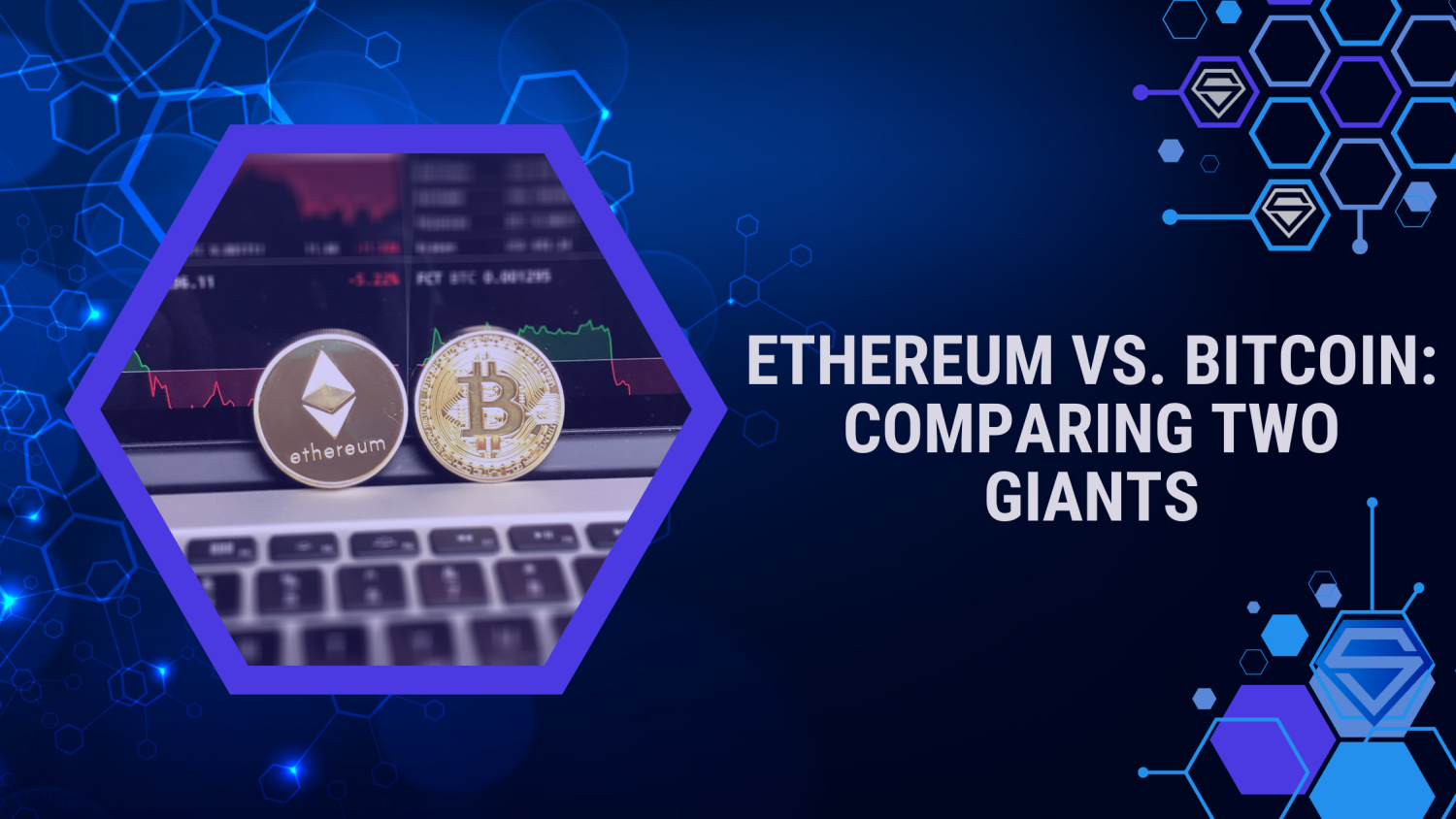
18. October, 2023
Ethereum vs. Bitcoin: Comparing Two Giants
In the ever-evolving world of cryptocurrency, two names stand out as giants, casting a significant shadow over the rest of the digital coin landscape – Ethereum and Bitcoin.
If you’re new to this exciting domain or just looking to deepen your understanding, you’re not alone in wondering which of these two stalwarts is worth your investment.
In this comprehensive blog, we’ll delve into the crucial differences between Ethereum and Bitcoin, addressing the pain points that have left many crypto enthusiasts in a state of perpetual curiosity.
Ethereum and Bitcoin – The Basics:
Before we jump into the nitty-gritty, let’s start with the basics.
Bitcoin is often regarded as the pioneer of cryptocurrencies. Created by the pseudonymous Satoshi Nakamoto in 2009, Bitcoin was the first digital currency to use a decentralized ledger technology called blockchain. It was primarily designed as a digital alternative to traditional money, offering a way to store and transfer value across the internet.
Ethereum, on the other hand, was conceived by the brilliant mind of Vitalik Buterin in 2015. Unlike Bitcoin, Ethereum is more than just a digital currency; it’s a versatile platform that allows developers to build decentralized applications (dApps) on its blockchain. These applications can cover a broad spectrum of uses, from finance to gaming and beyond.
Ethereum vs. Bitcoin – Key Differences:
Now, let’s get into the meat of the matter. Understanding the differences between Ethereum and Bitcoin is pivotal to making informed decisions in the crypto space.
Purpose and Functionality
Bitcoin: A Digital Safe Haven
Bitcoin, often hailed as “digital gold,” fulfills a dual role in the world of cryptocurrencies. First and foremost, it serves as a digital store of value, akin to a modern-day safe haven for your wealth. Just as gold has been treasured for centuries for its scarcity and durability, Bitcoin’s limited supply and robust security mechanisms make it an attractive choice for investors seeking to safeguard their assets. Bitcoin provides a reliable shelter against economic turbulence and inflation.
Additionally, Bitcoin functions as a medium of exchange, allowing users to transact seamlessly across borders. Its decentralized nature means that it operates independently of any central authority, empowering individuals with control over their financial transactions.
Ethereum: The Playground of Smart Contracts
Ethereum, in contrast, stands as a smart contract platform, introducing a paradigm shift in the world of blockchain technology. Smart contracts are self-executing contracts powered by code written directly onto the Ethereum blockchain. These contracts facilitate and automate complex transactions and agreements, eliminating the need for intermediaries and ensuring transparency and trust in the process.
Ethereum’s primary function is not just to transfer value but to act as an expansive ecosystem for decentralized applications (dApps). These applications cover an array of sectors, from decentralized finance (DeFi) protocols enabling lending and borrowing without traditional banks to non-fungible tokens (NFTs) revolutionizing the digital art and collectibles market.
Blockchain Technology
Bitcoin: A Tried-and-True Ledger
The blockchain technology underlying Bitcoin is robust, simple, and battle-tested. It primarily serves as a ledger for recording transactions. Bitcoin’s blockchain validates and documents every transaction, ensuring transparency and security. This technology is designed to efficiently transfer value from one party to another, making it the backbone of peer-to-peer transactions.
This straightforward approach provides a high degree of security and has proven itself as a trustworthy mechanism over the years.
Ethereum: The Turing-Complete Frontier
Ethereum’s blockchain technology takes a quantum leap forward, going beyond the foundational principles of Bitcoin. At its core, Ethereum employs a Turing-complete programming language, making it highly versatile. This computational sophistication opens the door to a wide array of possibilities.
Smart contracts, the hallmark of Ethereum, are created using this programming language, allowing the automatic execution of contract terms when predefined conditions are met. These smart contracts enable not only the transfer of value but also the execution of complex agreements and transactions.
Supply Cap
Bitcoin: The Gold Standard of Scarcity
Bitcoin stands as the gold standard when it comes to supply limitations. Its fixed supply cap of 21 million coins is a key factor contributing to its narrative as a store of value. This scarcity echoes the finite nature of precious resources like gold and adds to Bitcoin’s appeal for investors and enthusiasts alike.
As the supply of new Bitcoin gradually decreases due to the process of halving, it intensifies the deflationary aspect, further bolstering its reputation as digital gold.
Ethereum: A Different Approach
In contrast, Ethereum has taken a different approach to supply dynamics. Unlike Bitcoin, Ethereum does not possess a fixed supply cap. While this approach does not lend itself to the same inherent scarcity that Bitcoin enjoys, it also means that Ethereum’s economic model is more flexible. Ethereum’s supply of Ether (ETH) is not constrained by a predetermined number, leaving it without the same deflationary pressures as Bitcoin.
However, this allows Ethereum to adapt to changing circumstances and to potentially accommodate a larger user base, addressing the limitations of fixed supply.
Development Community
Bitcoin: A Pillar of Security and Stability
Bitcoin’s development community is renowned for its steadfast commitment to security and stability. With a long and proven history, Bitcoin’s developers have continually worked to enhance the network’s performance and fortify its defenses against potential vulnerabilities.
This well-established community places a premium on preserving the original vision of a decentralized and secure digital currency. Their collective dedication ensures that Bitcoin maintains its role as a reliable and resilient digital asset.
Ethereum: A Forge of Innovation
Ethereum’s development community is dynamic and constantly pushing the boundaries of blockchain technology. This community is at the forefront of innovation in the cryptocurrency space, driven by the platform’s flexibility and its capacity to support a wide array of applications. E
Ethereum’s developers are responsible for creating decentralized finance (DeFi) protocols, non-fungible tokens (NFTs), and an array of other groundbreaking technologies. Their collective creativity knows no bounds, making Ethereum a hotspot for blockchain innovation and expansion.
Conclusion
In the world of cryptocurrency, comparing Ethereum and Bitcoin is like contrasting apples and oranges. Both have unique qualities that cater to different investor profiles and use cases. Bitcoin remains the go-to choice for those seeking a secure store of value and a reliable medium of exchange. On the other hand, Ethereum shines as a platform for innovation, allowing developers to create a wide range of decentralized applications.
The decision of Ethereum vs. Bitcoin ultimately depends on your investment goals and your belief in the future of blockchain technology. Regardless of your choice, both these giants have made an indelible mark on the cryptocurrency landscape and will continue to shape its future.


